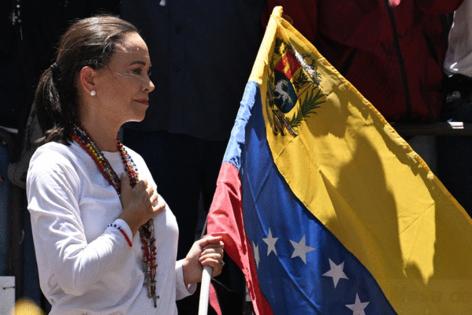Nobel Peace Prize awarded to Venezuelan Maria Corina Machado
Published in News & Features
Venezuelan opposition leader Maria Corina Machado was awarded the 2025 Nobel Peace Prize, for fighting for democracy at a time when an increasing number of countries slide into authoritarianism.
She receives the prize worth 11 million Swedish kronor ($1.2 million) “for her tireless work promoting democratic rights for the people of Venezuela and for her struggle to achieve a just and peaceful transition from dictatorship,” the Oslo-based Norwegian Nobel Committee said in a statement Friday.
Machado, 58, “has led the struggle for democracy in the face of ever-expanding authoritarianism in Venezuela,” the committee said. She steers the Vente Venezuela opposition party and has worked to unite pro-democracy forces in the country.
In her life before politics, she studied engineering and finance and had a short career in business before establishing a foundation that helps street children in Caracas. She was blocked from running in the 2024 presidential election, and in the past year has been forced to live in hiding due to threats against her life.
Machado “meets all three criteria stated in Alfred Nobel’s will for the selection of a Peace Prize laureate,” the committee said. “She has brought her country’s opposition together. She has never wavered in resisting the militarization of Venezuelan society. She has been steadfast in her support for a peaceful transition to democracy.”
Now it remains to be seen how this prize plays out in the geopolitics of the region. U.S. President Donald Trump, who lobbied hard to be awarded the prize himself, has taken a hard line against the strongman regime of Venezuela’s President Nicolas Maduro.
Trump has ordered multiple strikes on drug trafficking vessels at sea, and just this week called off U.S. diplomatic engagement, raising the specter of further and more direct military intervention.
Machado has expressed support for Trump’s stance on economic sanctions, but not military intervention, Kristian Berg Harpviken, director of the Norwegian Nobel Institute, told reporters.
“When authoritarians seize power, it is crucial to recognize courageous defenders of freedom who rise and resist,” the committee said.
It doesn’t always pan out when opposition leaders receive the award. A case in point is Myanmar’s Aung San Suu Kyi, 1991 laureate, who led opposition to the military junta ruling the country then known as Burma. The one-time democracy icon was later criticized internationally for doing too little to prevent the military’s massacre of the Rohingya population in the country.
She is the 20th woman to receive the prize among 143 laureates, including numerous organizations. In 2023 the accolade was given to Iranian human rights activist Narges Mohammadi, and in 2021 Maria Ressa of the Philippines shared the prize with Russia’s Dmitry Muratov. Malala Yousafzai, the youngest laureate of all time, shared the award in 2014.
Annual prizes for achievements in physics, chemistry, medicine, peace and literature were established in the will of Alfred Nobel, the Swedish inventor of dynamite, who died in 1896. The prize in economic sciences was added by Sweden’s central bank in 1968.
While the prizes have also generated controversy in the past, this year’s decision has been marked by an unprecedentedly aggressive campaign by Trump and his administration to secure the award.
“Trump’s campaign to get the prize has been extraordinary,” Harpviken said.
---------
—With assistance from Stephen Treloar, Thomas Hall, Federica Romaniello and Alan Crawford.
©2025 Bloomberg L.P. Visit bloomberg.com. Distributed by Tribune Content Agency, LLC.







Comments